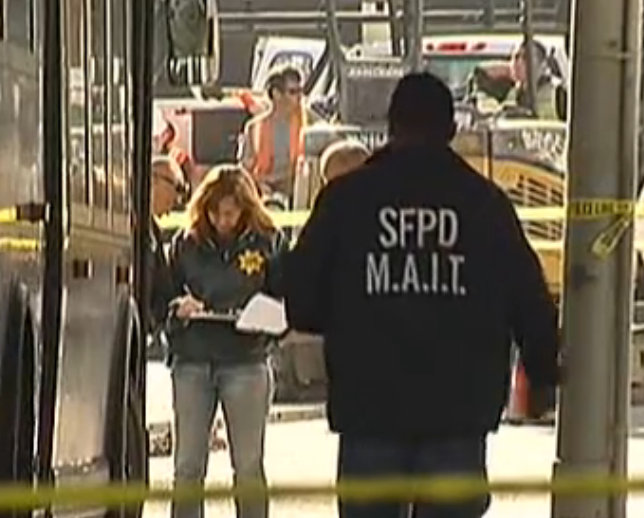Anyone who keeps track of the daily reports that come out of the SFPD's press office might be surprised to learn that the department has a policy of using the term "collision" -- not "accident" -- when referring to traffic crashes. That's because, in practice, the SFPD's top brass and press officers use "accident" as their term of choice, while "collision" is used only occasionally.

"It has always been 'collision.' 'Accident' is a term that is misused. There is always someone at fault, therefore, not an accident but a collision," said SFPD spokesperson Albie Esparza when asked about the discrepancy.
But SFPD regresses into "accident" mode very often. The department's most recent press release on a traffic collision was yesterday, sent out with the subject line, "Traffic Accident at Third and Gilman Streets":
The San Francisco Police Department responded to a traffic accident at approximately 12:59 pm. A 12 year old child was transported to SFGH for medical treatment. An accident investigation is taking place, and anyone who may have witnessed the accident is encouraged to call the police.
"We all grew up with the term 'car accident,' but in truth, they are traffic collisions," said SFPD Deputy Chief Mike Biel after a City Hall hearing on an apparent pattern of hostility and bias against bicycle riders in crash investigations. "Nobody goes out in the morning trying to crash their car into somebody or into something, so it's not done on purpose obviously -- unless they were driving recklessly and we can show that there was negligence -- but they are traffic collisions."
The department could do a lot more to show that it's committed to the idea that traffic violence is preventable. The term "accident," for instance, remains institutionalized in the name of the SFPD's Major Accident Investigation Team, whose members could be seen sporting their "MAIT"-embroidered jackets last Friday, at the site where a Muni bus driver ran over and killed 78-year-old Cheng Jin Lai on his bike. The SFPD's website also lists a phone number for an "Accident Investigation" hotline.
The SFPD's daily press recaps also regularly use the term "vehicle accident" for crashes like the October 4 incidents in which a trucker crushed and killed 68-year-old Emitt Jackson, and the crash at Sunset Boulevard and Wawona Street, in which a 56-year-old woman crossing the street was struck by a driver and hospitalized with life-threatening injuries. The practice is compounded when the SFPD's statements are repeated in media reports.
New York City's police department updated its lexicon by adopting the term "collision" this spring. While Streetsblog NYC reported three months later that NYPD was still using "accident" in its monthly reports and on its website at the time, the department soon corrected its reports after the inconsistency was pointed out.
For the SFPD, it's unclear when "collision" became the official term. As noted above, Esparza claimed "it has always been 'collision,'" but the General Orders listed on the SFPD's website include a section titled "Vehicle Accidents," adopted in 1994 [PDF].
The language we use to describe traffic violence is important. Do the officials charged with keeping our streets safe deem traffic crashes to be preventable tragedies that should be tackled with better street design and targeted traffic enforcement, or just an inevitable fact of life?
Bryan Goebel contributed reporting.





